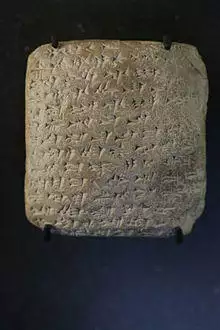Shunaam (Hebrew: שׁוּנֵם; in LXX Ancient Greek: Σουνὰν) was a small village mentioned in the Bible in the possession of the Tribe of Issachar. It was located near the Jezreel Valley, north of Mount Gilboa (Joshua 19:18). Shunaam is where the Philistines camped when they fought Saul, the first king of Israel (1 Samuel 28,4). It was the hometown of Abishag, King David's companion in his old age (1 Kings 1,1). The prophet Elisha was hospitably entertained there by a wealthy woman[1] whose deceased son Elisha brought back to life. (2 Kings 4:8)
|
|
Shunaam is listed as a town conquered by the Egyptian pharaohs Thutmose III and Shoshenk I.[2][3][4]
Shunaam may have been located at the site of the modern village of Sulam.[4]
See also
References
- ^ BibleGateway.com readings
- ^ a b c Gauthier, Henri (1928). Dictionnaire des Noms Géographiques Contenus dans les Textes Hiéroglyphiques Vol. 5. p. 103.
- ^ a b c Wallis Budge, E. A. (1920). An Egyptian hieroglyphic dictionary: with an index of English words, king list and geological list with indexes, list of hieroglyphic characters, coptic and semitic alphabets, etc. Vol II. John Murray. p. 1038.
- ^ a b John L. McKenzie, Dictionary of the Bible, Touchstone Press, 1965
![]() This article incorporates text from a publication now in the public domain: Easton, Matthew George (1897). Easton's Bible Dictionary (New and revised ed.). T. Nelson and Sons.
This article incorporates text from a publication now in the public domain: Easton, Matthew George (1897). Easton's Bible Dictionary (New and revised ed.). T. Nelson and Sons.
